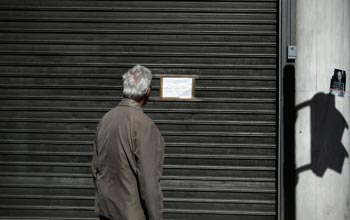Picture: www.ethnos.gr
Queues at ATMs in Cyprus are becoming longer every day. In parallel, the country is no longer considered to be reliable. The British Foreign Office has advised its citizens to carry cash and beware of theft. The first lacks on the market are already appearing and the Cyprus Federation of Professional Craftsmen and Shopkeepers has stated that card payments for purchases of fuel are no longer possible, thus revoking the Petrol Station Owners’ Union’s assurance of a few days ago. However, there are still fuels on the island.
 "Currently, we are at the bottom." The voice of 28-year-old Georgia Chrisantou sounds alarming, but unhesitating. "There is fear, but not because of the likely loss of our material wealth. We are scared of those who are pressuring us. What are our responsibilities as a society for all this?" said Georgia, who holds a Ph.D. and has two children, but has been unemployed for a month and a half. She did not spare her words as regards the responsibility of the Cypriots themselves. Her accusations had a "Greek" twist. "We've always been astute, but when you cannot make an appointment at the hospital, you have to call your MP and he makes it for you. If you have a minor accident at work, you settle a lifelong benefit. Furthermore, we have not been producing anything so far. We even import lemons from Argentina," added Georgia. "We, the young, are criticising ourselves, and we are ready for a "reset," assured the young woman. "So far, our generation has only been a spectator of the political reality, but now we will play the main part. "Initiatives are currently being implied for the establishment of a network of solidarity. "We started on Facebook with a profile named "I support the local market" where producers and shopkeepers offer various deals - for example, today, a shop offers a baguette and a litre of milk for 1.5 euro."
"Currently, we are at the bottom." The voice of 28-year-old Georgia Chrisantou sounds alarming, but unhesitating. "There is fear, but not because of the likely loss of our material wealth. We are scared of those who are pressuring us. What are our responsibilities as a society for all this?" said Georgia, who holds a Ph.D. and has two children, but has been unemployed for a month and a half. She did not spare her words as regards the responsibility of the Cypriots themselves. Her accusations had a "Greek" twist. "We've always been astute, but when you cannot make an appointment at the hospital, you have to call your MP and he makes it for you. If you have a minor accident at work, you settle a lifelong benefit. Furthermore, we have not been producing anything so far. We even import lemons from Argentina," added Georgia. "We, the young, are criticising ourselves, and we are ready for a "reset," assured the young woman. "So far, our generation has only been a spectator of the political reality, but now we will play the main part. "Initiatives are currently being implied for the establishment of a network of solidarity. "We started on Facebook with a profile named "I support the local market" where producers and shopkeepers offer various deals - for example, today, a shop offers a baguette and a litre of milk for 1.5 euro."
However, Tasoula Hovlarou, a retired teacher in Lefkosia, does not share her enthusiasm. "Cutting deposits would affect my life, but a failure would affect it even more seriously," she said. "Pensions have always been cut, but we have always accepted it without protest." 1974 and the current situation cannot be compared. "In 1974, we were receiving direct aid from the United States and Greece, both financial and material," said the old woman, who is a refugee from Kitreya. "Now, if we go bankrupt and exit the Eurozone, who will support us, in this global economic crisis?" she asked. Teacher George Aspros is also concerned. "I would support this "no" if there was a plan "B", but there is no such plan," he said bitterly. "Kids at school do not understand the seriousness of the situation." According to George Stoyas, this is also true for adults: "A lot of people are unaware of what a failure means." He created a Facebook page called "An initiative for Cyprus to remain in the Eurozone" because it is the only realistic solution.
A change in the climate
"A change in the climate has been observed in the last 24 hours, " said Dr. Costas Karatanasis, who is Greek and teaches at the University of Cyprus. "The hope in the Russians is agonising and plan "B" seems utopian, therefore people are in a state of panic." But 28-year-old Georgia said: "Young Cypriots will not follow the example of Greece; they will not just go out into the streets and protest, they will really change."
Meanwhile, Britain will send a group of senior experts, who will advise the country on how to save the banking system, headed by Tom Scholar of the British Ministry of Finance. The group will come at the invitation of the Cypriot government in an attempt to save the economy and avoid bankruptcy. The government has approved bills for the banking sector’s restructuring, as well as for the creation of a mutual fund that will save the country from exiting the Eurozone.